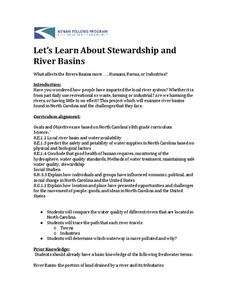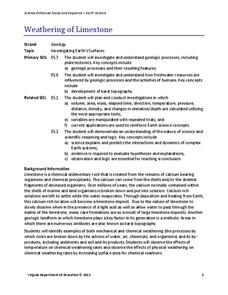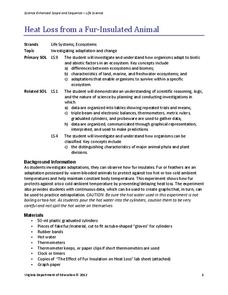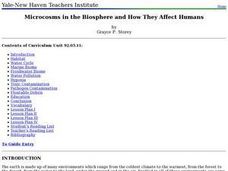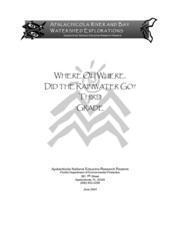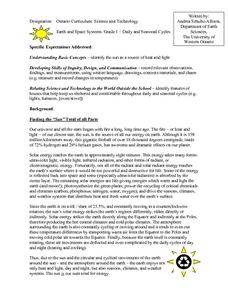Teach Engineering
Protecting Our City with Levees
Teams use the design process to design, build, and test a model levee to protect the town from a wall of water. A handout provides a price list for the materials learners can use to build their levee within a budget.
Cornell University
Predicting Chemical Reactions
Prove the Law of Conservation of Mass through a lab investigation. A well-designed lesson asks groups to combine materials and monitor indicators for chemical reactions. Measuring the mass of the reactants and products allows individuals...
Kenan Fellows
Let's Learn About Stewardship and River Basins
What does it mean to be a good steward? Middle school environmentalists learn to care for their state's waterways through research, a guest speaker, and poster activity. Groups must locate and learn more about a river basin and the human...
Curated OER
Salt of the Earth: A Caddo Industry in Arkansas
Middle schoolers explore the history of the Caddo Salt Industry found in Arkansas. Along with learning about how salt deposits formed in Arkansas, learners study the process of salt production and how valuable salt is as a natural...
Curated OER
Water Balance & Nitrogenous Waste Removal
Examine the structures of the kidney and then define the functions of the specialised structures. Every will find this powerpoint engaging, many of the images will present facts such as osmolarity of interstitial fluid and the negative...
Virginia Department of Education
Weathering of Limestone
We all know limestone weathers, but what affects the rate of weathering? Young scientists investigate the physical and chemical weathering of limestone (chalk) through experimentation. First, they conduct trials with different-size...
Virginia Department of Education
Go with the Flow
How does nature's hierarchy relate to our local human environment? Answer this question, along with others, as the class visually depicts the natural hierarchy provided by nature. Pupils discuss each piece of the pyramid and its energy...
Virginia Department of Education
Heat Loss from a Fur-Insulated Animal
How do animals adapt to weather changes? Provide your class with the ability to understand adaptations and body temperature as they participate in this hands on experiment, using fake fur and hot water. Pupils collect data and analyze...
Virginia Department of Education
The Cycles of Nature
Encourage peer collaboration and assist with the creation of visual aids to identify carbon, water, and nitrogen cycles as your class learns more about nature. They discuss relative information, create a visual aid depicting the chosen...
Cornell University
Chemical Reactions
Investigate the Law of Conservation of Mass through a lab exploration. Individuals combine materials to initiate chemical reactions. They monitor for signs of reactions and measure the masses before and after the reactions for comparison.
Biology Junction
Dissection of the Clam
Is the structure of a clam really as simple as it seems? Young scholars explore the anatomy of the clam in an engaging lesson presentation. The lesson highlights the digestive process of the clam as well as how it moves and what it does...
Curated OER
Snapshot Day Definitions and Activities
Here is a document full of teaching notes on water quality and bodies of water that you can use in your ecology curriculum. It has information specific to the Hudson River area, but can easily be adapted to any local body of water....
Curated OER
Science: Microcosms in the Biosphere
In a series of lessons, examine the impact on humans by microcosms in the biosphere. Among the plans structured for young scholars with different abilities and learning styles, are activities describing the symbiotic relationship,...
Curated OER
Aquatic Life
Sixth graders work in pairs to research information related to aquatic life using references from the World Wide Web. They present their findings in the form of an oral presentation to the class.
Curated OER
The World's Last Great Wilderness (Antarctica)
It's a shame that there are no photographs in this presentation because the information is fascinating! Each identically fashioned slide contains bullet points of information about Antarctica that will enhance an earth science...
Curated OER
The Global Precipitation Measurement Mission (GPM) Lesson
Introduce your class to one of the ways that technology is benefiting humanity. The Global Precipitation Measurement Mission involves the data collected by nine satellites from different countries with a united focus on studying world...
Curated OER
Is the Hudson River Too Salty to Drink?
Students explore reasons for varied salinity in bodies of water. In this geographical inquiry lesson, students use a variety of visual and written information including maps, data tables, and graphs, to form a hypothesis as to why the...
Curated OER
Air and Water in the Environment
Learners explore the traits of water condensation and evaporation. For this water cycle lesson, students develop an awareness of the importance of water for sustaining life. Learners participate in a hands-on activity in which water is...
Curated OER
Water Conservation
Students explore types of water reserves. In this water conservation activity, students brainstorm ways water are used in their homes. Students use a graduated cylinder to simulate the amount of water on Earth and the amount that humans...
Curated OER
Learning About Watersheds
In this learning about watersheds worksheet, students answer 15 questions using links to web resources about water use in their community. This page includes numerous links to helpful websites.
Curated OER
Where Oh Where Did the Rainwater Go?
Third graders conduct an experiment to determine how water moves through different soils found in the Apalachicola River watershed. They read a scenario, conduct the experiment, answer follow-up questions, and draw the water movement...
Curated OER
Daily and Seasonal Cycles
First graders identify the sun as a source of heat and light. They identify features of houses that help keep use sheltered and comfortable throughout daily and seasonal cycles. Students are told that summer is the best season to...
Curated OER
What Is a Watershed?
Students explore the concept of water pollution. In this environmental stewardship lesson, students discover what watersheds are and consider how to protect them.
Curated OER
Watershed Landscape
Students demonstrate how water flows by building a human watershed using themselves. In this ecology lesson plan, students compare and contrast point-source and non-point source pollution. They write what they have learned from this...




